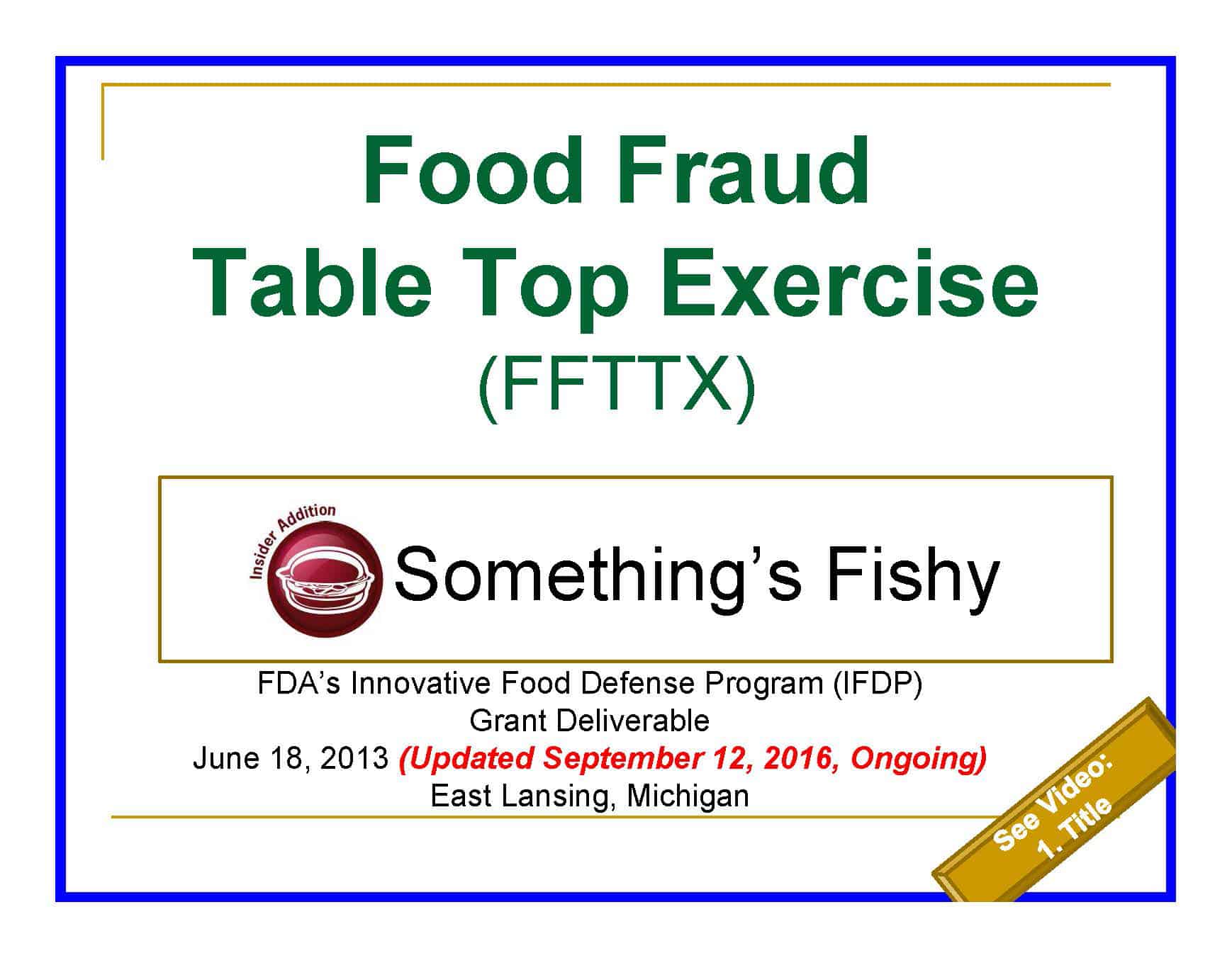Attached you will find our “Something’s Fishy” free and public Food Fraud Tabletop Exercise (FFTTX) that was the final deliverable for our 2013 FDA’s Innovative Food Defense Program (IFDP) grant. Feel free to use the content as you see fit. The grant deliverables included submitting materials ready to be posted online in the FDA FREE-B program Food Related Emergency Exercise Bundle (FREE-B).
Project Update Report: 
December 2015: The FFTTX grant project was completed in September 2013. In 2015 the USA Food Safety Modernization Act (FSMA) “Intentional Adulteration” draft rule (FSMA-IA) defined the scope only to “catastrophic events.” This covers terrorism and traditional FDA Food Defense scope as defined by HSPD-7 and -9. Specifically, FSMA-IA defined this section – and “Food Defense” – to cover only the very important and extremely complex concept of “catastrophic events” such as terrorism. FSMA-IA stated that “economically motivated adulteration,” and thus Food Fraud, would be covered under the FSMA Preventative Controls rule (FSMA-PC), which is the traditional “Food Safety” type of hazard. Thus, Food Fraud/EMA is no longer under “Food Defense” and thus outside the scope of the “Innovative Food Defense Program.” It is two years since we submitted the final report to FDA and we are not sure where – or if – it will be officially posted on FDA.gov. MSU and FDA are public institutions and the FFTTX is subject to distribution via the Freedom of Information Act (FOIA). Thus we published the content on www.FoodFraudPrevention.com.
///
The Michigan Department of Agriculture and Rural Development (MDARD) and MSU partnered to propose and deliver this grant. The Principal Investigator was Brad Deacon from MDARD. Michigan State University was a subcontractor with Principal Investigator John Spink and Researcher Doug Moyer. The goal of the grant was to improve the understanding of Food Fraud and the roles and legal authorities of participants in a state’s food emergency management plan.
From the grant proposal:
Development and Implementation of Food Defense Tabletop Workshop Exposing and Mitigating the Vulnerability of Economically Motivated Adulteration and Food Fraud Incidents (PAR-12-116)
The development of the content and the tabletop exercise project is relevant to public health and counterterrorism since increasing the awareness of economically motivated adulteration and food fraud, is, itself, a public health benefit, but also would reduce future opportunities for malicious attacks. This project leverages theory leadership and strong relationships between the Michigan Department of Agriculture (Principal Investigator: Deacon) and Michigan State University (Principal Investigator: Spink). Furthermore, this will leverage current relationships and credibility with a broad range of stakeholders including GMA, IFT, IAFP, AFDO, Great Lakes Border Health Initiative, Michigan State Police, FDA, FBI, US Customs, and the GCC/SCC. The project will include the development of a Free-B exercise.
//
Live Tabletop Exercise: Pilot Event, Michigan & Minnesota, 2013
The development of the research project culminated in a June 2013 live tabletop exercise held in East Lansing, Michigan. There were a wide range of participants from multiple federal, state, and local agencies representing agriculture, food, public health, and law enforcement, as well as industry representatives. In addition to the more than 65 participants in Michigan, the exercise created a multi-State scenario by connecting in real time to public health officials in the State of Minnesota.
To create a realistic complexity the scenario involved product that was produced and transported between Michigan and Minnesota. Participants from the Minnesota Department of Agriculture and the FDA Minneapolis District Office worked in tandem with the Michigan team to produce an incident plan. This work included reviews of how the incident would be addressed by FDA’s Rapid Response Team program.
The scenario included:
- “Bad Fish” found at a convenience store in Michigan
- Product distributed from a warehouse nearby in Michigan
- The product was Whitefish packaged in Minnesota
From the research, key questions addressed were:
- Is there a threat of violence against inspectors?
- When should law enforcement officers be involved?
- What was learned from the series of suspicious activity reports?
- What is a best practice for gathering information on Food Fraud?
- For a Food Fraud suspicious activity or incident
- What would happen?
- What should happen?
- How can that be enabled?
One of the biggest surprises for the participants was the question of:
- “At what point is the food inspector risking physical violence? There was a realization that we’re not combating a microbe and the adversary is a human criminal.
Live Tabletop Exercise: NEHA Convention, Nevada, 2014
Principal Investigator and MDARD Emergency Management Coordinator, Brad Deacon, received high praise when he conducted the FFTTX at the July 2014 National Environmental Health Association (NEHA) Convention. There were reportedly over 150 attendees.
This FFTTX scenario was intended to be a free and public document. Please feel free to use it as you see fit. Also, please let us know if you would like additional support or updated insight on Food Fraud.
Course Materials with Links to Video Presentation Version:
Note: these are free, open, and available for anyone to use in any setting. The content is copyrighted which just means it does need to be properly referenced.
Course Materials:
- Situation Manual (Instructor Guide): https://blog.foodfraudpreventionthinktank.com/wp-content/uploads/2021/02/FFttx-situation2.pdf
- Evaluator Form (Post Event Review): https://blog.foodfraudpreventionthinktank.com/wp-content/uploads/2021/02/ffttx-evaluator2.docx
- Presentation PowerPoint: https://blog.foodfraudpreventionthinktank.com/wp-content/uploads/2021/02/FFTTX2-basic2.pdf
- Videos (link to YouTube content – (contact us if your network does not allow access to YouTube.com):
- Title (6 minutes): https://youtu.be/0WDDOvyg-9A
- Grant Detail (12 minutes): https://youtu.be/nmCSlunDUlU
- Food Fraud Overview (16 minutes): https://youtu.be/JaU9DOaUgZk
- Law Overview (9 minutes): https://youtu.be/woXbKrXfFOk
- Module1 Pre-Incident (5 minutes): https://youtu.be/syibQHfLm1o
- Module2 Early-Incident (4 minutes): https://youtu.be/8eqGA-2hbX0
- Module3 Late-Incident (4 minutes): https://youtu.be/mGP8NXKygsM
- Module4 Aftermath (3 minutes): https://youtu.be/baJjcxL6K8Y
- Closing Remarks and Next Steps (x minutes): https://youtu.be/3Uc0I976oYE
- Appendix: Industry Activities and Direction (12 minutes): https://youtu.be/1acuPA1TJ9o
- Appendix: Marketing Notice Overview (8 minutes): https://youtu.be/1ziUS9_FX3k

